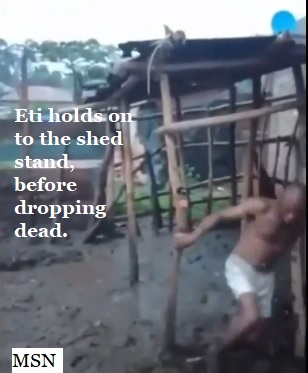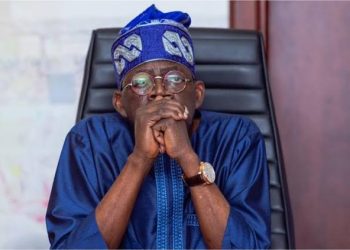Mr Babatunde Olushoto is a Nigerian man who chose to become a coffin maker and casket constructor even though he studied computer engineering.
Many may not know that casket is different from coffin. Though both are used for burial, Olushoto said “Casket is more complex to construct than coffin, and casket is more expensive than coffin.”
Olushoto has been making both for more than 20 years as his means of livelihood. He is married and has two children.
He spoke in an interview with DAILY TRUST on Saturday.
The interesting aspect of Olushoto’s profession is the fact that he is a trained Computer Scientist who earned his First Degree in Computer Science from the Federal University of Technology Akure, Ondo State. He graduated at the time computer graduates were sort after by multinational companies and industries all over the world. It was a period when the whole world was becoming computerized and graduates with such skills had the privilege of choosing where to be employed.
Amazingly, Olushoto refused to allow such opportunities to work and live comfortably in Europe or America with good pay to determine his choice of life career. Rather, he dropped his Computer certificate and settled in a carpentry shop somewhere in Dadin Kowa, Jos.
When asked why he refused to aspire for jobs in rich oil companies and other multinational industries on Nigeria and abroad, Olushoto simply said, “It is all about passion. I just love to do constructions with wood.”
Olushoto stated that he developed an irresistible passion for coffin and casket making from a very tender age. “I took the skills from my father. This shop known as ‘Last Home’ was set up by my father long ago. I grew up as a child to meet my father in this shop, it is from this shop my father got married to our mom and raised his family. It is from this aspect of carpentry work that my father trained me and my siblings in formal education. My father sent me to the university with his earnings in making and selling coffins.”
Olushoto is the first born of the family of seven. When he was a kid, he loved watching his father working at the shop. “I always run to my father’s shop immediately after school to watch him making the coffins, at a point I saw myself assisting my father. I started developing interest in the way my father does the construction. So, on my own, I became an apprentice in my father’s shop. My father had several apprentices then, and I made myself one of them. And when my father noticed my interest in the job, he began to teach me the skills.”
At the time Olushoto completed his secondary school education in Jos, he has already mastered the skills of coffin construction. However, his father sent him to the university to obtain a degree, but on completion of his university education, Olushoto refused to join the already saturated labour market like many graduates, he simply returned to his father’s shop to do what he like best. He was so good that his father handed the shop over to him and retired. And so, for the last 20 years, Olushoto has run his father’s coffin factory efficiently and effectively.
“I learnt it from my dad; the shop belongs to my dad. My father started training me in his shop when I was younger. I grew up to see my father doing the caskets and he trained me because I was interested in learning. So, the passion to be a casket maker started from there, to the extent that even when I went to the university to study Computer Science, I didn’t have as much passion in the course as I had for casket making. I only went to the university to get good education and be a degree holder.
When I was pursuing the admission, I never had any course in mind, I was ready to study any course. So, I eventually got admission to do computer science, and I did it and graduated with good result.
“The fact that I’m not practicing what I studied doesn’t mean that I don’t like computer science. I’m happy I did the course, but my passion is in what my father thought me. I cherish that carpentry skills than the computer knowledge.
In spite of his love for making coffins, the society hardly appreciate such skills. Many feel it is a trade that thrives on people’s death, and so whoever is into such trade is stigmatised as someone who wishes others death, or who smiles when people die.
Such mind set never deterred Olushoto from doing what he likes best. He said, “My belief as a Christian is that death is a natural thing that must happen. Death is the end of every mortal. And so, I don’t need to pray for someone to die for me to get good business. It occurs naturally; not by my wish. People have been dying before I was born and people will continue to die even if I stop selling coffins today. So, it is not about me praying or wishing for people to die. My style of prayer then is, if death do happen, let the bereaved come and patronize my business. That is how I pray; I don’t pray for death but I pray for those in need of casket to patronize me.”
Casket making is not a business that can be comfortably advertised because of the sentiments attached. “Many think if you advertising casket, you are wishing people death. So, the best business plan is to build relationship with people. A relationship that will make them refer people to you and talk good about you. So, your public relations rating must be good for mourners to patronize you.”
On how he feels dumping Computer Science, he said, “I never dumped my Computer Science training, I am applying the computer knowledge in the casket making. And that is why I have an edge over my competitors in the state. My computer knowledge has made me improve on the training my father gave me. You know my father did his own with no educational background, but with my educational background, I have improved on what my father handed over to me. So, my knowledge of computer science is a waste; there is the application of computer in every discipline all over the world. You know casket making is construction work, and so computer knowledge is very key in casket making. I am combining both trainings to make a living.”
Though he inherited the trade from his father, Olushoto who now has two children said, “I will not compel my children to take after this skill as I did from my father, I will prefer they make their own choices. I inherited it from my father willingly, my children can inherit it from me if they are willing. I am not going to impose it on them. I will allow them make their choice and that is why I will train them to university level just as my father did. When they graduate, whatever they chose to do is left for them. I inherited the trade from my father not because he forced me to accept but I developed the passion to do it. My siblings chose other careers and professions, but my interest is on this trade, and it is just natural to me, I love doing it. That was why I never looked for job after my university education, I simply returned to my father’s business in this very shop. And when my father saw that I was good on the trade, he simply retired and handed over the shop to me as his first son.”









